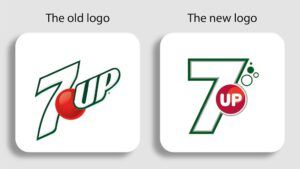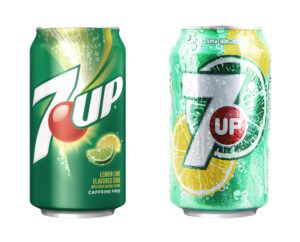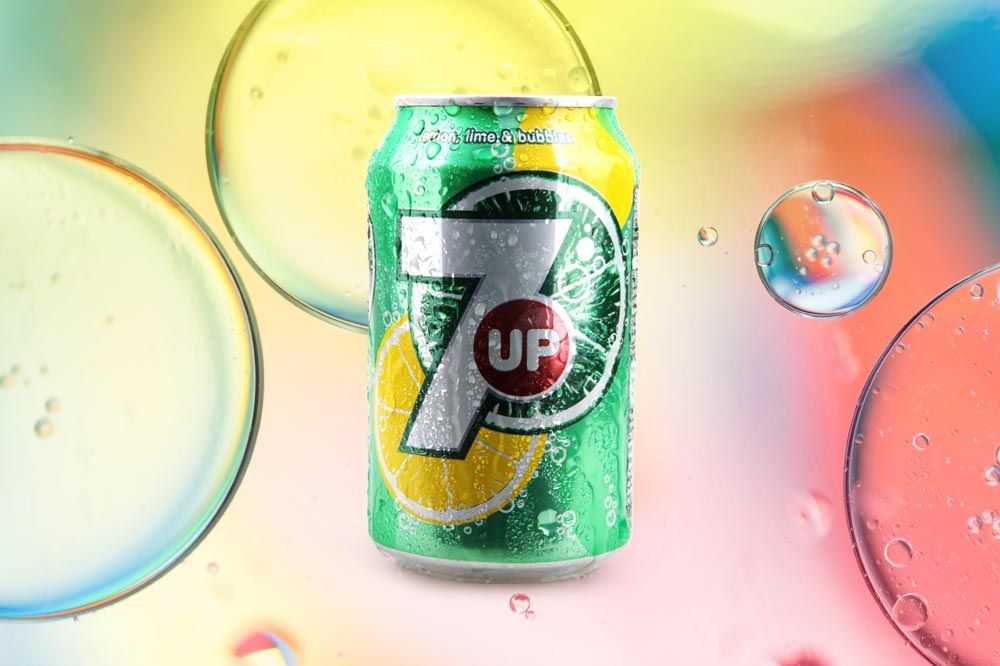7up has unveiled a new branding initiative in an effort to modernize its image and appeal to younger consumers. The iconic lemon-lime soda has been a popular beverage brand for over nine decades, but the company recognized that its previous branding, with its classic red and green logo and whimsical design, may no longer resonate with younger consumers who prioritize wellness and sustainability. The new branding represents a bold move for the company and aims to stay competitive in a crowded beverage market where new and innovative brands emerge.
7Up New Logo and Branding
The new 7up branding features a bold, stunning logo with a bright green background and a stylized leaf symbol. The word “7up” is displayed in lowercase font, with the “7” placed slightly above the “up”. The leaf symbol represents the company’s commitment to using natural ingredients and sustainable practices. The new branding aims to communicate the company’s commitment to health and wellness while still maintaining its playful and refreshing spirit.

Marketing Strategy
7up’s new marketing campaign focuses on the concept of “refreshing moments”. The company is highlighting how 7up can be a refreshing choice for consumers in all sorts of situations, from a mid-day pick-me-up to a post-workout thirst quencher. The campaign includes a range of digital and social media ads, in-store displays, and product packaging. The company has also developed a “Virtual Refreshment Stand” to help consumers learn more about the brand and its sustainability initiatives.
Public Reception
The public reaction to the new 7up branding has been largely positive, with many people praising the new logo for its fresh and modern look, as well as its emphasis on sustainability. The new branding’s focus on natural ingredients and sustainability has resonated well with consumers who are increasingly concerned about the environment and their health. However, some people have criticized the logo for looking too simplistic or not being “fun” enough.

7up’s Efforts Towards Sustainability
In addition to the new branding, 7up has also taken significant steps towards becoming a more sustainable brand. The company has committed by 2025 to be using 100% recycled plastic in all of its packaging. This is a part of the company’s overall goal to reduce its carbon footprint and minimize its impact on the environment.
In addition to this, 7up has also launched a new line of carbonated water called “7up free”, which is marketed as a healthier and more sustainable alternative to traditional soda. The product comes in aluminum cans that are fully recyclable and made from recycled materials. By promoting this product, 7up is encouraging consumers to make more sustainable choices and reduce their overall environmental impact.
Moreover, 7up has partnered with local organizations and charities to support sustainability initiatives in various communities. The company has organized clean-up campaigns, tree-planting events, and other community-led sustainability projects. By actively participating in such initiatives, 7up is aiming to make a positive impact on the environment and contributing to a more sustainable future.
By prioritizing sustainability and making concrete efforts towards reducing its environmental impact, 7up is not only attracting younger and more environmentally conscious consumers but also taking on a leadership role in the beverage industry towards a more sustainable future.
Conclusion
7up’s rebranding initiative is a significant effort by the company to modernize its image and stay competitive in an ever-evolving beverage market. The new branding emphasizes the company’s commitment to using natural ingredients and sustainable practices while still maintaining its refreshing and playful spirit. We will have to wait to see how the new branding affects 7up’s sales and market share in the coming months and years. Regardless of the outcome, the new branding initiative has put 7up in a strong position to appeal to a younger, more health-conscious audience, which is essential for the brand’s long-term success.









